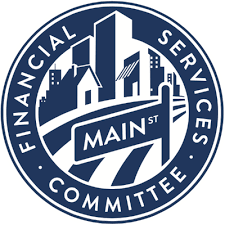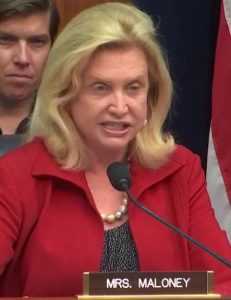 A House hearing for a top Fed regulator turned into a figurative passing of the gavel from Republicans to Democrats.
A House hearing for a top Fed regulator turned into a figurative passing of the gavel from Republicans to Democrats.
Randal Quarles is the Vice Chairman for Supervision and he was testifying in front of the House Financial Services Committee in his bi-annual testimony on November 14, 2018.
The current chair of the House Financial Services Committee- which is the most important committee on Capitol Hill to the trading world- is Jeb Hensarling, a Republican from the State of Texas, but as a result of the November 6 election, Democrats will be taking over the committee since they now control the House of Representatives.
Hensarling used his opening statement to acknowledge this fact, congratulating the Democrats on their win
“I will do everything today to ensure there will be an efficient and peaceful transfer power.” Hensarling said. “The majority side stands ready and prepared to everything possible for there to be an efficient and peaceful transition of power on this committee.”
While committee assignments have not yet technically been released for the next Congress, it is a foregone conclusion that Maxie Waters, a Democrat from the State of California and the current ranking member, or chief of the current minority, will be taking over.

“I would like to acknowledge the ranking member’s long-time participation on this committee.” Hensarling said.
Hensarling is retiring and he leaves his Chairmanship with significant accomplishments.
While Republicans have not outright repealed Dodd/Frank, in May 2018, President Trump signed into law the Economic Growth, Regulatory Relief and Consumer Protection Act, which significantly reformed it.
This law started as the Financial Choice Act and passed out of the House Financial Services Committee; a deal was negotiated when the bill reached the Senate, leading to the final product.
One reform not part of the new bill is the so-called Volcker rule, which remains in place.
The Volcker rule, which forbids banks for engaging in proprietary trading, has been blamed by Hensarling for illiquidity in the corporate bond market, which trade over the counter; banks, who make markets in these bonds are in many cases considered to be engaging in proprietary trading and forbidden.
While Hensarling was not able to replace that rule, his continued criticism throughout the past two years were the initial spark for an issue which eventually received plenty of debate.
The Federal Reserve is one of five regulators, and they are looking to reform that rule as well.
During his turn to ask questions, Hensarling asked Quarles, “In your tenure on the Fed, have you concluded if there a nexus between fixed income markets volatility and illiquidity and the Volcker rule?” Hensarling asked?
“I think it’s inarguable from the experience of markets participants,” Quarles answered, saying in effect, that the rule was making these markets more illiquid.
When Waters took her turn, she clearly laid out where the ideological battle will be fought over the next two years.
“I do feel it is appropriate to discuss Dodd/Frank and the harmful effects of the current committee majority to weaken and rollback parts of this law.” Waters said.
The Economic Growth, Regulatory Relief and Consumer Protection Act, which aimed to reduce and streamline regulations, was part of a larger effort by President Trump to do the same with all regulations.
That is generally supported by his party and opposed by Democrats.
On financial regulations, specifically, Democrats generally believe that the 2008 financial crisis showed that financial companies were in desperate need of more regulation while Republicans saw Dodd/Frank and other legislative and executive ideas as massive over reach.
Indeed, it’s noteworthy that Dodd/Frank was responsible for Quarles position at the Fed, when that law mandated the creation of this position.
Democrats have long argued that the Fed needs to take a more active role in regulation and enforcement and that portion of Dodd/Frank aimed to fix this.
Republicans, on the other hand, argue that this creates yet another regulator, who is only overlapping with other regulators to create confusion; the Federal Reserve is one of five regulators with oversight over the Volcker rule.
Waters represents an area of Los Angeles County which is much more liberal than the US itself; Waters is virulently anti-Wall Street and by extension anti-trading.
But her effect on the industry is not clear, first, this is the age of Donald Trump, where almost nothing is predictable.
Second, as the chair of the Financial Services Committee, she has certain powers, but she can’t impose a left-wing agenda.
Laws she’d like to impose have no chance of getting through the Republican led Senate, nor would the President ever sign them.
As such, anything which could pass must be done through deal-making.

Another powerful person in the committee will be Carolyn Maloney, a Democrat from the State of New York.
She is currently the ranking member of the most important sub-committee for traders, the Capital Markets, Securities, and Investment sub-committee; she is likely to become chair of that or another powerful sub-committee.
There will be many proxy wars fought in the House Financial Services Committee over the direction of regulation and one will be over the so-called stress tests.
“Very painful to many of us the memory of a financial crisis where we lost $13 trillion of household wealth, nine million jobs, millions of homes and unemployment was at ten percent.” She said. “Bank profits are now higher than they’ve ever been, $173 billion, I believe the highest ever. So, we’ve bounced back. The banks are good; the economy is humming, but I’m very concerned about any effort to roll back the stress test.”
The bank stress test “is an analysis conducted under hypothetical unfavorable economic scenarios, such as a deep recession or financial crisis, designed to determine whether a bank has enough capital to withstand the impact of adverse economic developments. In the United States, banks with $50 billion or more in assets are required to do internal stress tests by their own risk management team as well as by the Federal Reserve.” According to the website Investopedia.
The current chair of the Capital Markets, Securities and Investments sub-committee is Bill Huizenga, a Republican from the State of Michigan.
During his question and answer period, Huizenga also took aim at the Volcker rule, “Needless, to say, many people believe the Volcker rule was a solution in search of a problem.”
Quarles for his part emphasized the theme of transparency, using that word repeatedly.
“Transparency is part of the foundation of public accountability and a cornerstone of due process. It is also key to a well-functioning regulatory system and an essential aspect of safety and soundness, as well as financial stability.” Quarles said in his written comments.“Transparency provides financial firms clarity on the letter and spirit of their obligations; it provides supervisors with the benefit of exposure to a diversity of perspectives; and it provides markets with insight into the condition of regulated firms, fostering market discipline. Transparency increases public confidence in the role of the financial system to support credit, investment, and economic growth.”








